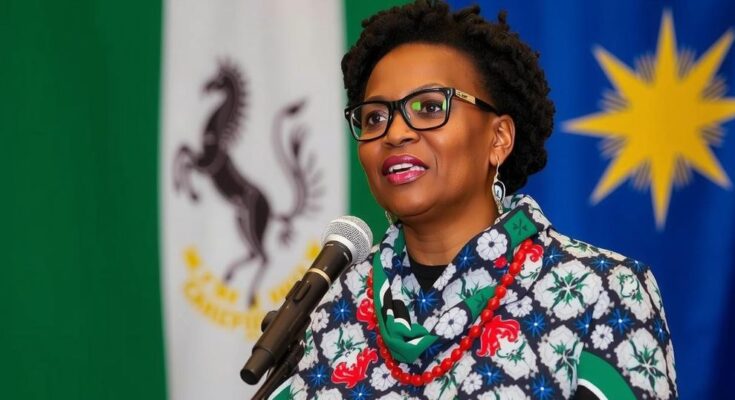Namibia may elect its first female president with Vice President Netumbo Nandi-Ndaitwah as a frontrunner in this week’s elections. With 1.4 million registered voters and 15 political parties competing, SWAPO’s lead is challenged by its past electoral performance amidst corruption allegations. Nandi-Ndaitwah pledges to create jobs and address women’s issues, as competition from newer parties rises. The outcome could reshape Namibia’s and the region’s political landscape.
Namibia is poised to potentially elect its first female president in the upcoming elections this week, with Vice President Netumbo Nandi-Ndaitwah as a leading candidate. Over 1.4 million registered voters, representing nearly half of the population, will participate in these elections, which include 15 political parties vying for presidency and National Assembly seats. Nandi-Ndaitwah and her party, the South West Africa People’s Organization (SWAPO), are believed to hold an advantage, according to early voting results from Namibia’s foreign missions and other special polls.
However, SWAPO’s dominance has been challenged since it lost its two-thirds majority in the National Assembly during the 2019 elections, largely due to corruption allegations within the fishing industry. Political analyst Henning Melber cautioned that SWAPO must engage younger voters, who prioritize governance and accountability over historical narratives. Nandi-Ndaitwah, if elected, has committed to addressing the country’s significant unemployment rate and focusing on women’s issues such as reproductive rights and equal pay. Furthermore, should she ascend to the presidency, she would follow in the footsteps of influential female leaders on the continent.
As the elections now approach, Nandi-Ndaitwah’s path toward the presidency appears contingent on her ability to inspire confidence in her leadership, particularly in light of SWAPO’s recent electoral setbacks. The political arena is witnessing heightened competition not only from established parties but from new entrants like the Independent Patriots for Change and the Affirmative Repositioning party. The outcome of this election may signify a pivotal moment in Namibia’s political landscape, much like recent shifts seen in neighboring African countries.
The upcoming elections in Namibia have garnered significant attention, particularly as they may see the election of the country’s first female president, Netumbo Nandi-Ndaitwah. With widespread political shifts occurring across southern Africa, including alterations in ruling parties and public sentiment towards governance, Namibia’s elections could reflect broader regional trends. Notably, SWAPO, the long-standing ruling party since independence from South Africa’s apartheid government, faces criticism over prior corruption scandals, which have potentially alienated younger voters. The results of these elections will also be closely monitored regarding their implications for gender representation in African politics, underscoring current discussions surrounding women’s rights.
In conclusion, Namibia’s forthcoming presidential election represents a historic opportunity for the potential election of its first female president, Netumbo Nandi-Ndaitwah. As she campaigns on job creation and women’s empowerment, her success will likely hinge on appealing to both traditional and younger voters who are increasingly critical of established political narratives. The election outcome may not only affect Namibia’s political trajectory but could also resonate throughout southern Africa’s evolving political landscape.
Original Source: abcnews.go.com




